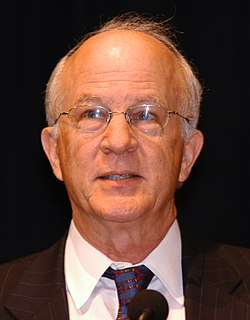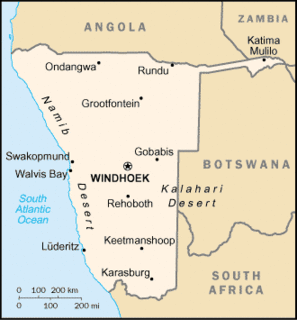
South West Africa was the name for modern-day Namibia when it was under South African administration, from 1915 to 1990.
The history of Namibia has passed through several distinct stages from being colonised in the late nineteenth century to Namibia's independence on 21 March 1990.

Chester Arthur Crocker is an American diplomat and scholar who served as Assistant Secretary of State for African Affairs from June 9, 1981, to April 21, 1989, in the Reagan administration. Crocker, architect of the U.S. policy of "constructive engagement" towards Southern Africa including apartheid-era South Africa, is credited with setting the terms of Namibian independence.

The United Nations Transition Assistance Group (UNTAG) was a United Nations (UN) peacekeeping force deployed from April 1989 to March 1990 in Namibia to monitor the peace process and elections there. Namibia had been occupied by South Africa since 1915, first under a League of Nations mandate and later illegally. Since 1966, South African forces had been combating an insurgency by the People's Liberation Army of Namibia (PLAN), the military wing of the Namibian-nationalist South West African People's Organization (SWAPO). The UN Security Council passed Resolution 435 in 1978, which set out a plan for elections administered by South Africa but under UN supervision and control after a ceasefire. However, only in 1988 were the two parties able to agree to a ceasefire. As UNTAG began to deploy peacekeepers, military observers, police, and political workers, hostilities were briefly renewed on the day the transition process was supposed to begin. After a new round of negotiations, a second date was set and the elections process began in earnest. Elections for the constitutional assembly took place in November 1989. They were peaceful and declared free and fair; SWAPO won a majority of the seats. The new constitution was adopted four months later and it was followed by Namibia's official independence and the successful conclusion of UNTAG.

Louis Alexander Pienaar was a South African lawyer and diplomat. He was the last white Administrator of South-West Africa, from 1985 through Namibian independence in 1990. Pienaar later served as a minister in F W de Klerk's government until 1993. He married Isabel Maud van Niekerk on 11 December 1954.

United Nations Commissioner for South West Africa was a post created by the United Nations General Assembly (UNGA) in 1966 to assert the UN's direct responsibility for South West Africa which was then under illegal occupation by apartheid South Africa.
United Nations Security Council Resolution 264 was adopted on March 20, 1969, after a General Assembly resolution terminated the mandate of South West Africa (Namibia).
United Nations Security Council Resolution 269, adopted on August 12, 1969, condemned the government of South Africa for its refusal to comply with resolution 264, deciding that the continued occupation of South West Africa was an aggressive encroachment on the authority of the United Nations. The resolution also called for South Africa to remove its administration of South West Africa before October 4, 1969, calling on all states to refrain from dealings with either country and noting it would consider a further meeting if the present resolution was not implemented to discuss further action the Council could take.

United Nations Security Council Resolution 385, adopted unanimously on January 30, 1976, recalled previous resolutions on the topic as well as an advisory opinion of the International Court of Justice that South Africa was under obligation to withdraw its presence from the Territory of Namibia. The Resolution reaffirmed the United Nations' legal responsibility over Namibia, expressed its concern over the continued illegal actions of South Africa and deplored the militarization of Namibia.

United Nations Security Council Resolution 439, adopted on November 13, 1978, after recalling resolutions 385 (1976), 431 (1978), 432 (1978) and 435 (1978), the Council condemned South Africa for its decision to proceed unilaterally with elections in Namibia in contravention of previous resolutions. The Council considered this a clear defiance of the authority of the United Nations.

United Nations Security Council resolution 447, adopted on 28 March 1979, after hearing representations from the People's Republic of Angola and the South West Africa People's Organisation (SWAPO), the Council recalled resolutions 387 (1976) and 428 (1978) and condemned South Africa for its continuing raids in direct violation of prior resolutions.

United Nations Security Council resolution 532, adopted unanimously on 31 May 1983, after hearing a report from the Secretary-General and reaffirming resolutions 301 (1971), 385 (1976), 431 (1978), 432 (1978), 435 (1978) and 439 (1978), the Council condemned South Africa's continued occupation of Namibia, then known as South West Africa.

United Nations Security Council resolution 539, adopted on 28 October 1983, after hearing a report from the Secretary-General and reaffirming resolutions 301 (1971), 385 (1976), 431 (1978), 432 (1978), 435 (1978), 439 (1978) and 532 (1983), the Council condemned South Africa's continued occupation of Namibia, then known as South West Africa, and the tension and instability prevailing in southern Africa as a result.

United Nations Security Council Resolution 545 was adopted on 20 December 1983; after hearing representations from the People's Republic of Angola, the Council recalled resolutions 387 (1976), 428 (1978), 447 (1979), 454 (1979) and 475 (1980), and expressed its concern at the continuing attacks on the country by South Africa through occupied South West Africa.

United Nations Security Council resolution 546, adopted on 6 January 1984, after hearing representations from the People's Republic of Angola, the Council recalled resolutions 387 (1976), 428 (1978), 447 (1979), 454 (1979), 475 (1980) and 545 (1983), and expressed its concern at the continuing attacks on the country by South Africa through occupied South West Africa.

United Nations Security Council resolution 566, adopted on 19 June 1985, after recalling resolutions 269 (1969), 276 (1970), 301 (1971), 385 (1976), 431 (1978), 432 (1978), 435 (1978), 439 (1978), 532 (1983) and 539 (1983), the Council expressed concern at the tension and instability caused the continued occupation of Namibia by South Africa, noting the apartheid policies implemented in the territory and that the territory was used as a springboard for attacks on other southern African countries.

United Nations Security Council resolution 601, adopted on 30 October 1987, after recalling resolutions 269 (1969), 276 (1970), 301 (1971), 385 (1976), 431 (1978), 432 (1978), 435 (1978), 439 (1978), 532 (1983), 539 (1983) and 566 (1985), the Council again condemned South Africa for its continued "illegal" occupation of Namibia and its refusal to comply with previous resolutions.

United Nations Security Council resolution 606 was adopted unanimously on 23 December 1987, after recalling Resolution 602 (1987) and noting the Secretary-General's report authorised by that resolution. The Council condemned South Africa for its continued occupation of southern parts of the People's Republic of Angola and for its delay in withdrawing its forces from the area.

United Nations Security Council resolution 643, adopted unanimously on 31 October 1989, after reaffirming resolutions 435 (1978) and 629 (1989), 632 (1989) and 640 (1989), as well as noting a report by the Secretary-General Javier Pérez de Cuéllar, the Council expressed its full intention to implement Resolution 435 of 29 September 1978 regarding the situation in Namibia.
The “Namibia exception” identifies the Advisory Opinion issued on 21 June 1971 by the International Court of Justice (I.C.J), the principal judicial organ of the United Nations (UN). The opinion refers to the "Legal Consequences for States of the Continued Presence of South Africa in Namibia notwithstanding Security Council Resolution 276 (1970)".







